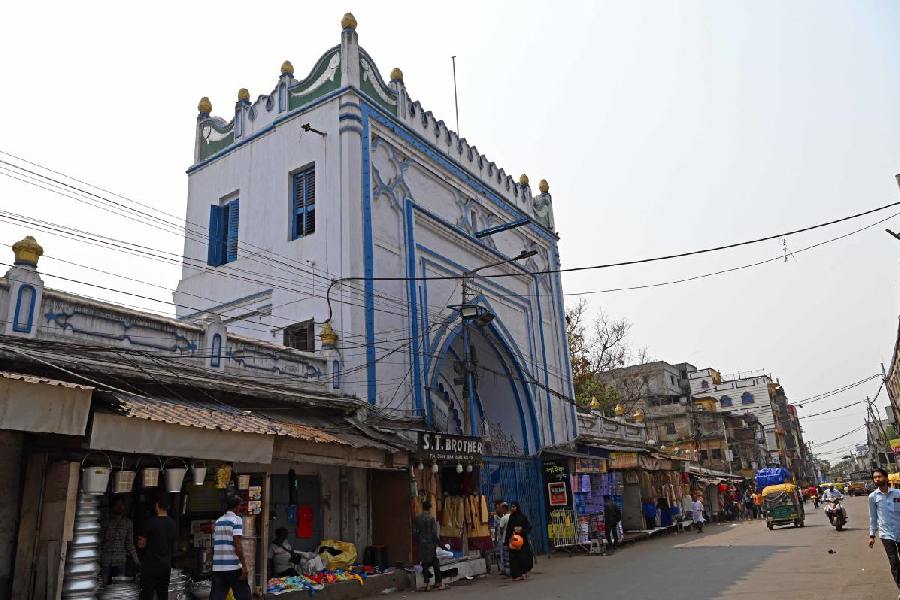Two years ago, a blue plaque was put up at Bichali Ghat in Metiabruz to commemorate Nawab Wajid Ali Shah’s arrival in Calcutta in 1856.
Now the city will honour his memory by restoring a century-and-a-half-old structure that stands as a monument to the arts-loving nawab’s years in exile here following the British annexation of his kingdom.
Shah had built the Sibtainabad Imambara in Metiabruz in the 1860s, and was laid to rest there after his death in 1887. The 200th birth anniversary of the nawab — whom Satyajit Ray immortalised in his 1977 film Shatranj Ke Khiladi — was widely celebrated last year.
The Sibtainabad Imambara was listed as a Grade-I structure in the civic body’s Graded List of Heritage Buildings, published in 2009. But like many of the city’s architectural and historical jewels, it has been crying out for care.
Its roof is on the verge of collapse. Diagonal cracks run across its walls. The kadi-barga panels on the ceiling are worn out, and horizontally placed bamboo poles now support the ceiling.
The Kolkata Municipal Corporation (KMC) has given the restoration contract to heritage conservation company Caltech, with a deadline of 18 months. Caltech has previously restored the Buxa Fort in Alipurduar.
The imambara has always been open to the public for mourning during Muharram.
“The king used to come here during congregations. This is the last imambara built by any king of Awadh, and the only one outside the kingdom of Awadh,” said Irfan Ali Mirza, a descendant of the nawab and Begum Hazrat Mahal. Mirza is one of the trustees running the imambara.
A little over Rs 4 crore has been allocated for the restoration, said Anjan Mitra, the conservation architect who planned and designed the restoration.
“The structure is in a distressed condition. Multiple portions of the roof are on the verge of collapse,” Mitra said.
A large section of the roof on the eastern side of the imambara has been pulled down. Mitra said part of this portion had already collapsed and pulling the rest down was the only option. “We will have to deplaster and strengthen the walls,” he said.
Pinaki Ghosh, proprietor of Caltech, said the remaining part of the eastern side of the roof too was beyond repair. “It has to be pulled down. You can see that bamboo poles have been fitted to prevent the roof and the wall from collapsing,” Ghosh said.
Caltech is also engaged in restoring the chapel at Dr Graham’s Homes in Kalimpong.
Another notable structure that the nawab built in Calcutta, and which still stands, is the Shahi Masjid, or the king’s private mosque.
Shahanshah Mirza, a descendant of the nawab, said the plaque at Bichali Ghat was installed by the West Bengal Heritage Commission two years ago.
Shahanshah said the nawab was a symbol of communal harmony. “He was a Muslim king but he patronised the dance form Kathak, which originated in the temples of north India,” he said.
Wajid Ali Shah’s son from his second wife Begum Hazrat Mahal, who rose against the British during the 1857 rebellion, too is buried in the Sibtainabad Imambara.
So is Mirza Hamid Ali Bahadur, son of the nawab and his first wife, Alam Ara Khas Mahal.
KMC officials said the restoration of the imambara had been planned before the Covid pandemic set in.
In July 2023, the restoration project was awarded to Caltech but the state government raised objections over some “technical issues”.
After the KMC provided certain clarifications, the state government gave the nod.Earlier this month, the mayoral council of the KMC formally approved the restoration project.
“We had to float two tenders, and both times only one company submitted bids. We signed a contract with them after the second tender,” an official said.











